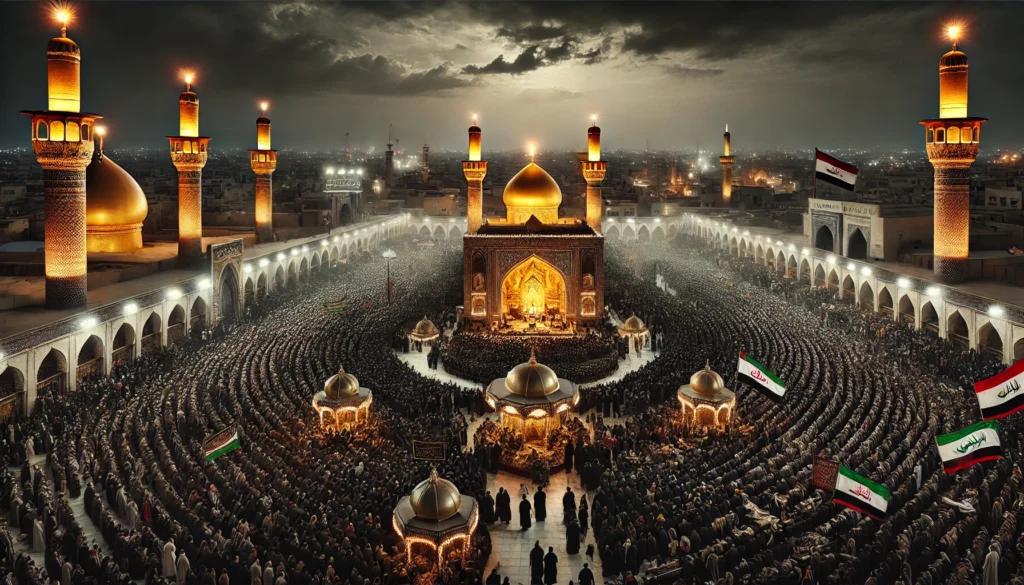Muharram, the first month of the Islamic calendar, holds profound significance for Muslims worldwide. This sacred month, particularly the Day of Ashura, commemorates the martyrdom of Imam Hussain, the grandson of Prophet Muhammad (PBUH), at the Battle of Karbala. Each year, millions of devotees embark on a pilgrimage to the holy cities of Karbala and Najaf in Iraq, creating a remarkable spectacle of faith and unity.
The Spiritual Significance of Muharram
Muharram is not just a month of mourning but also a period of reflection and spiritual rejuvenation. The tragic events of Karbala, where Imam Hussain and his followers stood against tyranny, inspire pilgrims to uphold values of justice, sacrifice, and resilience. Imam Hussain was slaughtered by individuals claiming to be Muslims, but their actions starkly contradicted the core tenets of Islam. His martyrdom was not only a defence of Islam but also a defence of human rights for everyone, regardless of their faith.
The Journey to Karbala
Karbala, located approximately 100 kilometres southwest of Baghdad, becomes the epicentre of Muharram commemorations. The city is home to the Shrine of Imam Hussain, a magnificent structure that symbolises the ultimate sacrifice for righteousness. Pilgrims from diverse backgrounds and corners of the globe converge here, transforming Karbala into a mosaic of cultures and languages united by a common purpose.
Visiting Najaf
Just a short distance from Karbala lies Najaf, another city of immense religious importance. Najaf houses the Shrine of Imam Ali, the cousin and son-in-law of Prophet Muhammad (PBUH). Imam Ali’s shrine is a beacon of spiritual light, drawing millions who come to pay their respects. The journey from Karbala to Najaf is often undertaken on foot, symbolising a pilgrim’s devotion and endurance.
The Magnificence of the Pilgrimage
The pilgrimage to Karbala and Najaf during Muharram is an extraordinary experience. The streets are adorned with black banners, and the air resonates with recitations of elegies and prayers. Despite the sorrowful remembrance, there is a profound sense of unity and brotherhood. Pilgrims often participate in majlis (gatherings), where scholars recount the events of Karbala, reinforcing the timeless message of Imam Hussain’s stand against oppression.
Cultural and Social Impact
The influx of pilgrims significantly impacts the local economy and culture of Iraq. Hotels in Karbala and Najaf witness full occupancy, and local businesses thrive. Moreover, the pilgrimage fosters a sense of global Islamic unity, as people from different countries and sects come together in peace and mutual respect.
Practical Travel Tips for Pilgrims
- Travel Documents: Ensure you have a valid visa and passport. Iraq offers special pilgrimage visas during Muharram.
- Accommodation: Book your accommodation in advance, as hotels fill up quickly during this period.
- Health Precautions: Stay hydrated and be mindful of health advisories. It’s advisable to carry basic medical supplies.
- Local Etiquette: Respect local customs and religious practices. Dress modestly and be prepared for security checks.
The pilgrimage to Karbala and Najaf during Muharram is a testament to the enduring legacy of Imam Hussain and his message of justice and faith. This spiritual journey not only deepens the pilgrim’s connection to their beliefs but also highlights the rich cultural tapestry of Iraq. Imam Hussain’s sacrifice transcends religious boundaries, advocating for human rights and justice for all. For those seeking a profound religious experience, visiting Karbala and Najaf during Muharram is a pilgrimage like no other.
For more information on planning your pilgrimage and understanding the significance of these holy sites, explore our detailed travel guides and tips.
Muharram, Karbala, Najaf, Iraq travel, pilgrimage, Shrine of Imam Hussain, Shrine of Imam Ali, Ashura, Islamic pilgrimage, religious travel, travel tips for Karbala, Najaf pilgrimage guide, visiting Iraq during Muharram
stayiniraq.com



